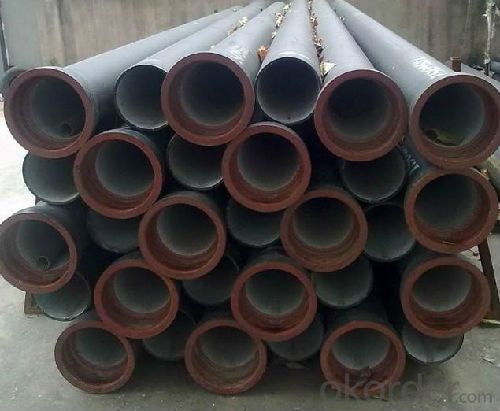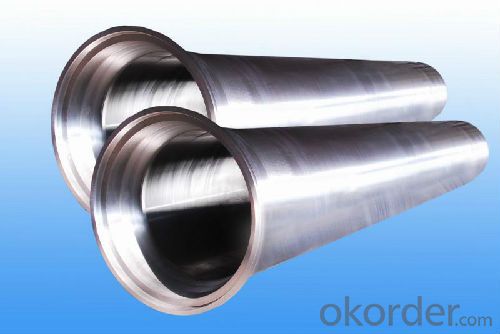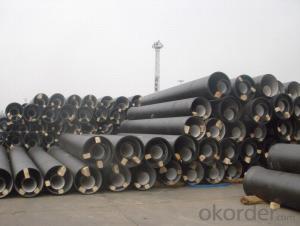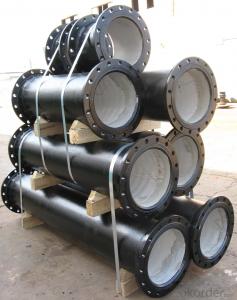Ductile Iron Pipe ISO2531 C CLASS DN1600
- Loading Port:
- China main port
- Payment Terms:
- TT or LC
- Min Order Qty:
- 20 m.t.
- Supply Capability:
- 200000 m.t./month
OKorder Service Pledge
OKorder Financial Service
You Might Also Like
1.Ductile Iron Pipe Description :
1) Pipes confirm to ISO2531,K9 class,T type joint,6m long,with inside cements lining conform to ISO4179,outside Zincspraying(130g/m2) and bitumen coating(70μm) conform to ISO8179
2) Pipe ends: Spigot and socket ends, with 100% SBR rubber gaskets accoding to ISO4633
DI pipe fittings are manufactured according to ISO 2531 or BS EN545 or BS4772 FOR POTABLE WATER ,internal is cement lining or wet epoxy coating;External is zinc plus bitumen or wet epoxy coating.
2.Main Features of the Ductile Iron Pipe:
Trustworthy financial strength.
One-stop shopping.
Fast and efficient service.
Coordination of shipments from multiple plants.
Specialists of the overseas shipping process.
A more competitive price.
3.Ductile Iron Pipe Images:


4.Ductile Iron Pipe Specification:
Internal lining: ductile iron pipes shall have an internal cement mortar lining in acc with ISO4179.
External coating: ductile iron pipes shall be externally coated with metallic zinc spray plus a further layer of resin
painting to ISO8179.
Gasket:100% SBR/NBR/EPDM rubber gasket in accordance with ISO4633.
Packing:ductile iron pipes from DN100 to DN300 be bundled with steel belts, others are in bulk.
Payment term: L/C, T/T.
5.FAQ:
We have organized several common questions for our clients,may help you sincerely:
1.Q: Why would you choose ductile iron pipe rather than other pipe materials?
A:The reasons are obvious for that not only ductile iron pipe possesses the inherent strength and flexibility of ductile
iron, combined with proven corrosion protection systems, but also the cost savings can be achieved from design to
installation and commissioning.
2.Q:Why can you guarantee the inner of pipes can’t be corroded?
A: High alumina cement mortar lining and sulphate-resistant cement mortar lining. These two special linings are applicable
to inner anti-corrosion for sewage pipes, improving resistance to erosion of the sewage components.
- Q:How are ductile iron pipes protected against external damage?
- Ductile iron pipes are protected against external damage through a variety of methods. One common method is the application of a protective coating to the pipe's exterior surface. This coating acts as a barrier, shielding the pipe from corrosive elements in the surrounding environment. Additionally, ductile iron pipes can be encased in concrete or a protective sleeve to provide further protection against external damage, such as impact or abrasion. Regular inspections and maintenance are also essential to identify any potential issues and ensure the ongoing protection of ductile iron pipes.
- Q:What does ductile iron pipe "ND200" mean?
- The tube is thin from the metal tube, and the outer diameter of the tube is almost the same as the inner diameter of the tube, so the average value of the outer diameter of the tube and the inner diameter of the pipe is called the diameter.
- Q:Are ductile iron pipes suitable for horizontal directional drilling (HDD) installations?
- Yes, ductile iron pipes are suitable for horizontal directional drilling (HDD) installations. Ductile iron pipes are known for their strength and durability, making them an excellent choice for HDD projects. HDD involves drilling a horizontal hole underground and pulling a pipe through it, which can be challenging due to the forces exerted on the pipe during installation. Ductile iron pipes can withstand these forces and maintain their structural integrity, ensuring a successful HDD installation. Additionally, ductile iron pipes have excellent corrosion resistance, making them suitable for various soil and environmental conditions encountered during HDD projects. Overall, ductile iron pipes offer the necessary characteristics to withstand the rigors of HDD installations and are a reliable choice for such applications.
- Q:How do ductile iron pipes handle heavy traffic loads?
- Ductile iron pipes are known for their exceptional strength and durability, making them well-suited to handle heavy traffic loads. Their high tensile strength and resistance to cracking or breaking under pressure allow them to withstand the weight and stress generated by heavy traffic. Additionally, the flexible nature of ductile iron allows it to absorb and distribute the load, reducing the risk of damage or failure. Overall, ductile iron pipes are a reliable choice for handling heavy traffic loads in various infrastructure systems.
- Q:What is the expected joint deflection of ductile iron pipes?
- The expected joint deflection of ductile iron pipes depends on various factors such as the diameter, wall thickness, and type of joint used. However, in general, ductile iron pipes are designed to have a joint deflection capability of up to 5 degrees for restrained joints and up to 10 degrees for flexible joints.
- Q:Are ductile iron pipes suitable for underground applications?
- Indeed, underground applications are well-suited for ductile iron pipes. Renowned for their durability, strength, and resistance to corrosion, these pipes emerge as an excellent option for installations that lie beneath the surface. Their ability to withstand immense loads, ground shifts, and external pressure further solidifies their appropriateness for burial underground. Moreover, given the challenges associated with access and maintenance in underground scenarios, the fact that ductile iron pipes boast a lifespan of over 100 years becomes invaluable. In conclusion, the reliability and suitability of ductile iron pipes for underground applications are underscored by their robustness and longevity.
- Q:What are the different methods for anchoring ductile iron pipe?
- Depending on the specific application and requirements, there are various methods available for anchoring ductile iron pipe. One method involves the construction of concrete thrust blocks around the pipe at points where there are changes in direction or diameter. These blocks resist the thrust forces from the flowing water and prevent pipe movement. Another option is to install concrete collars or rings at regular intervals along the pipe. These collars provide additional support and prevent lateral movement. They are created by pouring concrete into a pre-made mold surrounding the pipe. Pipe clamps are metal brackets that can be attached to the pipe and anchored to a structure or support system. They come in different sizes and designs, allowing for flexible installation and adjustment as needed. Pipe restraints are specifically designed devices to restrict the movement of ductile iron pipe. Typically, they consist of a metal band or collar tightened around the pipe and attached to a concrete structure or anchoring system. The bell and spigot joint itself can serve as a means of anchoring the pipe. The bell end of one pipe fits over the spigot end of another, creating a tight connection that resists movement. Properly compacted soil surrounding the pipe can also provide some level of anchoring. The soil should be compacted in layers around the pipe to ensure stability and prevent movement. It is important to consider factors such as soil conditions, pipe diameter, operating pressure, and location when selecting the appropriate anchoring method. Consulting industry standards, guidelines, and a qualified engineer is crucial in determining the best anchoring method for a specific ductile iron pipe installation.
- Q:What are the advantages of cast iron pipes?
- The ductile iron pipe with flexible joint construction, convenient operation, can improve the efficiency of construction, improve the construction conditions, reduce the construction cost, and most of the rubber ring connection interface, simple operation, can shorten the construction period, reduce the construction cost.
- Q:How is ductile iron pipe manufactured?
- The manufacturing of ductile iron pipe involves a specific process called centrifugal casting. To start, iron is melted in a furnace and certain elements like carbon and silicon are added to achieve desired properties. Once the iron is melted, it is poured into a mold or die that is rotating at a high speed. As the molten iron is poured into the rotating mold, centrifugal force causes the liquid metal to move towards the inner surface of the mold. This force results in the metal solidifying from the outer surface inward. This creates a pipe with a dense outer layer and a more porous inner layer. The centrifugal casting process guarantees that the outer surface of the pipe is free from impurities and defects, ensuring its strength and durability. Once the pipe has solidified, it is taken out of the mold and undergoes further processing. The pipe is cleaned, excess material is trimmed, and any imperfections on the surface are eliminated. It is then given a protective coating, such as zinc or epoxy, to enhance its resistance to corrosion. The final step in the manufacturing process is quality control and testing. Ductile iron pipes go through various tests to ensure they meet the required standards. These tests include hydrostatic pressure testing, dimensional inspection, and inspection of the internal and external coating. In conclusion, ductile iron pipe is manufactured using the centrifugal casting process, which involves melting iron, pouring it into a rotating mold, and allowing it to solidify under the influence of centrifugal force. The resulting pipe is then cleaned, coated, and subjected to rigorous quality control to ensure its strength, durability, and adherence to standards.
- Q:Are ductile iron pipes suitable for irrigation canal systems?
- Yes, ductile iron pipes are suitable for irrigation canal systems. Ductile iron pipes are known for their high strength and durability, making them ideal for withstanding the pressure and load requirements of irrigation canal systems. They have a high resistance to external loads, such as heavy machinery, and can handle the stress caused by soil movement and settlement. Additionally, ductile iron pipes are highly resistant to corrosion and provide a smooth inner surface, which minimizes friction and ensures efficient water flow. This is crucial for irrigation systems as it allows for the effective distribution of water to crops, ensuring optimal growth and yield. Ductile iron pipes also have a long service life, typically exceeding 100 years, which makes them a cost-effective option for irrigation canal systems. Their low maintenance requirements further contribute to their suitability for this application. Overall, ductile iron pipes offer the necessary strength, durability, corrosion resistance, and efficiency required for irrigation canal systems, making them a suitable choice for this purpose.
1. Manufacturer Overview |
|
|---|---|
| Location | |
| Year Established | |
| Annual Output Value | |
| Main Markets | |
| Company Certifications | |
2. Manufacturer Certificates |
|
|---|---|
| a) Certification Name | |
| Range | |
| Reference | |
| Validity Period | |
3. Manufacturer Capability |
|
|---|---|
| a)Trade Capacity | |
| Nearest Port | |
| Export Percentage | |
| No.of Employees in Trade Department | |
| Language Spoken: | |
| b)Factory Information | |
| Factory Size: | |
| No. of Production Lines | |
| Contract Manufacturing | |
| Product Price Range | |
Send your message to us
Ductile Iron Pipe ISO2531 C CLASS DN1600
- Loading Port:
- China main port
- Payment Terms:
- TT or LC
- Min Order Qty:
- 20 m.t.
- Supply Capability:
- 200000 m.t./month
OKorder Service Pledge
OKorder Financial Service
Similar products
New products
Hot products
Related keywords


























